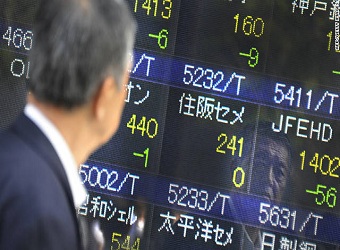The Australian dollar slipped Tuesday afternoon, despite the Reserve Bank of Australia ‘s (RBA) largely expected decision to keep its monetary policy on hold, while equities around the region struggled for gains.
The RBA kept its cash rate unchanged at a record low of 1.50 percent, citing improvements in conditions of the global economy including recent upticks in international trade and industrial production and the tightening of labor markets in many countries.
The Australian dollar fell to $0.7582 at 1:00 p.m. HK/SIN, following the RBA’s decision, from levels above $0.76 earlier in the session.
In the stock market, the benchmark ASX 200 dropped 0.32 percent, with most sectors trading lower.
The heavily-weighted financial subindex was down 0.73 percent in late-afternoon trade as shares of major Australian banks slipped, ANZ declined 0.5 percent, while the Commonwealth Bank fell 0.8 percent and Westpac was down 0.72 percent and the National Australia Bank dipped 0.75 percent.
In Japan, the Nikkei 225 fell 1.04 percent, as stocks came under pressure from a stronger yen, while across the Korean Strait, the Kospi was down 0.2 percent.
Chris Weston, chief market strategist at spreadbettor IG, reckoned Tuesday’s trade had a “distinct risk-off vibe, although the moves in equities are probably best described as a ‘drift’, rather than a ‘spike’ lower.”
In the currency market, the dollar traded at 100.45 against a basket of currencies at 1:04 p.m. HK/SIN, climbing from levels below 99.60 reached in the previous week but dropping from levels near 100.60 earlier this week.
“The dollar index has, for three straight sessions, tried and failed to trade above its 50-day moving average, last located around 100.67,” said analysts at Singapore’s DBS Bank in a Tuesday note.
Among major currency pairs, the yen traded at 110.43 to the dollar, strengthening from levels above 111.0 and likely pressuring Japanese export stocks.
Automakers, in particular, appeared to have been under pressure, as shares of Toyota declined 1.16 percent, Nissan was down 3.22 percent and Honda fell 2.95 percent.
Meanwhile, Toshiba shares dropped 9.29 percent. On Monday, Reuters citing sources said the troubled Japanese conglomerate would likely miss a third deadline to report its quarterly business results.
Among other currency pairs, the euro traded at $1.0669, while the British pound fetched $1.2474.
Oil prices traded flat on Tuesday during Asian hours, following an overnight decline. Global benchmark Brent traded at $53.11 a barrel, while U.S. crude was at $50.24 at 10 a.m. HK/SIN.
Reuters reported that Libya’s Sharara oil field, the country’s largest, resumed production on Sunday following a one-week disruption. The field was producing around 120,000 barrels per day on Monday and about 220,000 bpd prior to the March 27 shutdown.
More broadly, investors this week will be eyeing the meeting between Chinese President Xi Jinping and President Donald Trump on April 6 where the two leaders will have no shortage of weighty issues to discuss, including trade and North Korea among others.
“There is justifiable tension/apprehension building over the meeting between Presidents Trump and Xi this week as the former’s China bashing over alleged mercantilist policies presumably sets the stage for what could be testy talks,” said Vishnu Varathan, a Singapore-based economist at Mizuho Bank.
Varathan noted fears of collision course are overdone and reckoned the two leaders will find “face-saving, ‘win-win’ deals to showcase.”
Markets in China and Taiwan remained shut on Tuesday for a public holiday.
Source: CNBC
